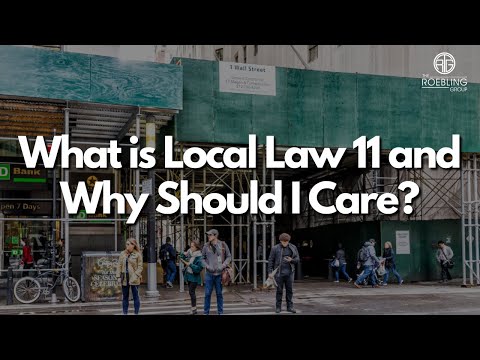
Hello and welcome to an informative article discussing Local Law 11: A Comprehensive Overview of Building Safety Regulations in the US!
Before we dive into the intricacies of Local Law 11, it is important to note that this article aims to provide a general understanding of the topic. It is essential to cross-reference the information provided with other reliable sources and consult legal advisors for specific legal advice relating to your unique circumstances. With that said, let’s explore the fascinating world of building safety regulations in the United States.
Understanding Local Law 11 in Construction: A Comprehensive Guide
Understanding Local Law 11: A Comprehensive Overview of Building Safety Regulations in the US
📋 Content in this article
Introduction:
Building safety regulations play a crucial role in ensuring the safety and structural integrity of buildings. In the United States, each state and local jurisdiction has its own set of building codes and regulations. One such regulation that is often of importance to construction professionals is Local Law 11. In this comprehensive overview, we will delve into the key aspects of Local Law 11, providing you with a solid understanding of its purpose and requirements.
1. What is Local Law 11?
Local Law 11, also known as the Facade Inspection Safety Program (FISP) or the Local Law 11/98, is a building safety regulation that applies to buildings in New York City. Its primary objective is to ensure the safety of the facades (exterior walls) of buildings above a certain height. The law mandates periodic inspections of these facades to detect any hazardous conditions that could compromise public safety.
2. Who does Local Law 11 apply to?
Local Law 11 applies to all buildings in New York City that are six stories or higher. This includes residential, commercial, and mixed-use buildings. It is important to note that even if a building falls under an exemption category for a specific inspection cycle, it may still be subject to subsequent inspection requirements.
3. How does Local Law 11 work?
Under Local Law 11, building owners are required to hire a qualified architect or engineer to conduct a façade inspection every five years. The appointed professional must prepare a report detailing the findings of the inspection, identifying any unsafe conditions or necessary repairs. This report must then be submitted to the New York City Department of Buildings (DOB) within a specified timeframe.
4. What happens after the inspection?
If the inspection report reveals unsafe conditions, the building owner is obligated to address these issues promptly. Failure to do so can result in penalties, fines, and even legal consequences.
Understanding the Requirements for Local Law 11 Compliance
Understanding Local Law 11: A Comprehensive Overview of Building Safety Regulations in the US
Local Law 11 is a crucial building safety regulation that applies to buildings in the United States. It outlines the requirements for the maintenance and inspection of facades, ensuring the safety of occupants and pedestrians. Understanding the requirements for Local Law 11 compliance is essential for building owners and managers to avoid penalties and maintain a safe environment.
To help you navigate through the complexities of Local Law 11, we have compiled a comprehensive overview of the key aspects you need to know:
Understanding Local Law 11: A Comprehensive Overview of Building Safety Regulations in the US
In the United States, building safety regulations are governed by a complex system of laws designed to ensure the safety and integrity of our constructed environment. One key component of these regulations is Local Law 11, which specifically relates to building safety in cities and municipalities.
Local Law 11, also known as the Facade Inspection and Safety Program (FISP) in New York City, is a critical piece of legislation that focuses on the maintenance and inspection of building facades. Its main purpose is to identify and address potential hazards posed by deteriorating facades, such as falling debris, unstable structures, or other safety risks.
This article aims to provide a comprehensive overview of Local Law 11 and its significance in building safety regulation throughout the US. It is important to note that while this article strives for accuracy and reliability, readers should always verify and cross-reference the information provided with official sources and consult with professionals in the field to ensure up-to-date and accurate information.
Understanding Local Law 11:
1. Scope: Local Law 11 applies to buildings that are six stories or higher and are constructed with materials such as masonry, concrete, or steel. It requires regular inspections and maintenance of building facades to prevent potential hazards.
2. Inspection Cycle: Local Law 11 mandates that buildings covered by the law must undergo a façade inspection every five years. This inspection is carried out by qualified professionals who assess the structural integrity and safety of the building’s facade.
3. Filing Requirements: Building owners must file reports detailing their inspection findings with the local authorities. These reports provide crucial information about any identified issues, necessary repairs or maintenance, and timelines for completion.
4. Compliance: Non-compliance with Local Law 11 can result in penalties, fines, or legal actions.
